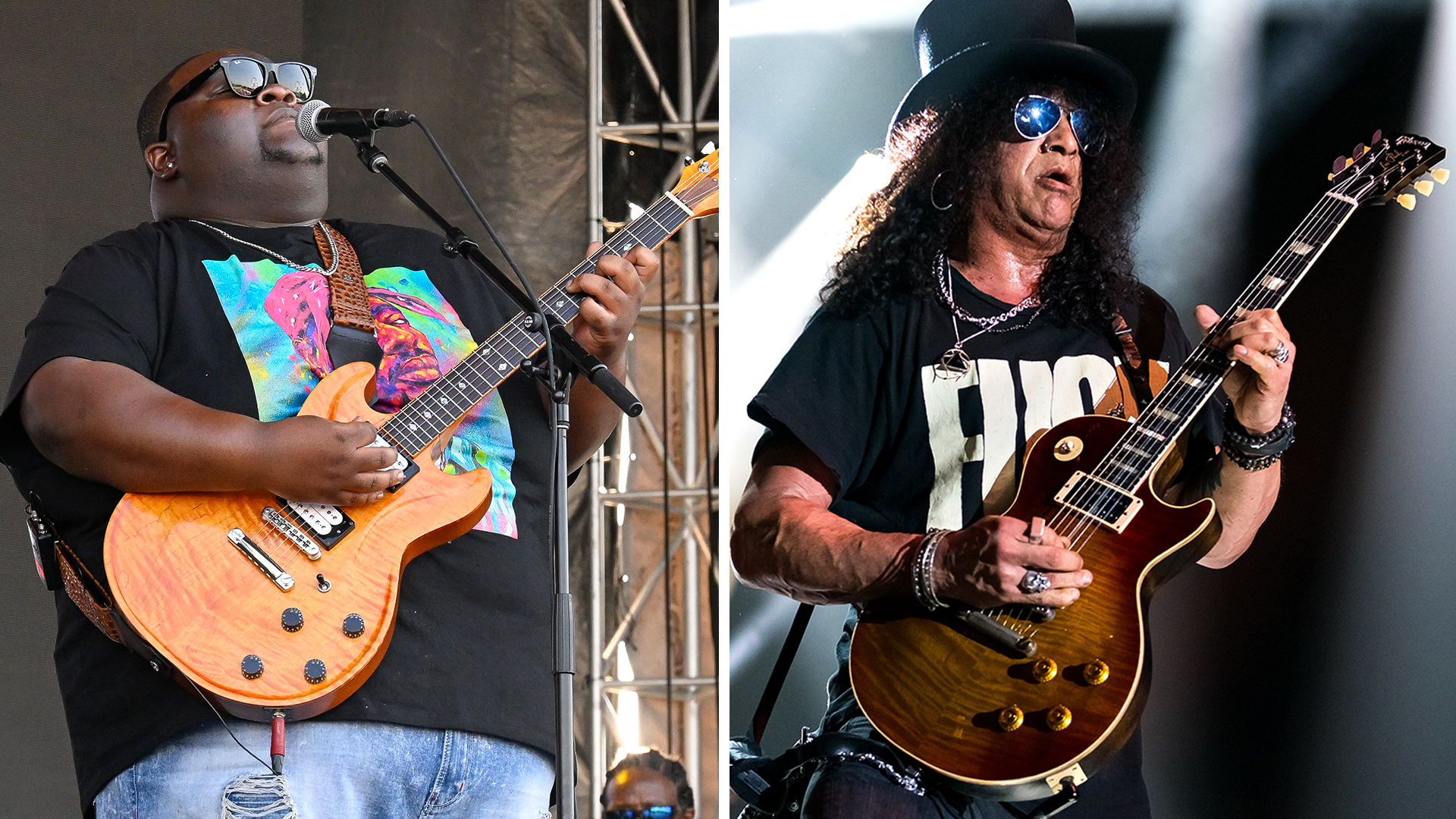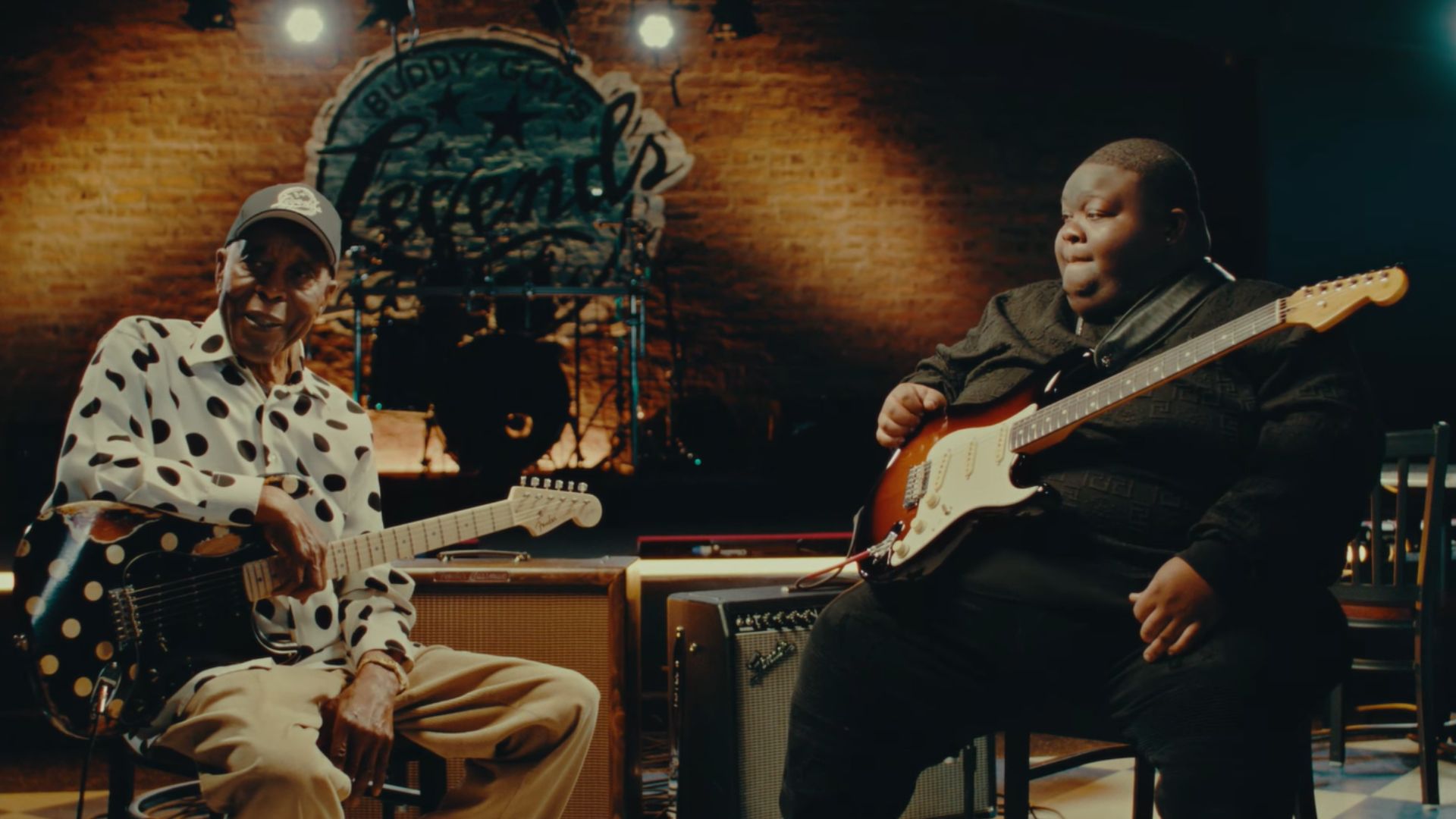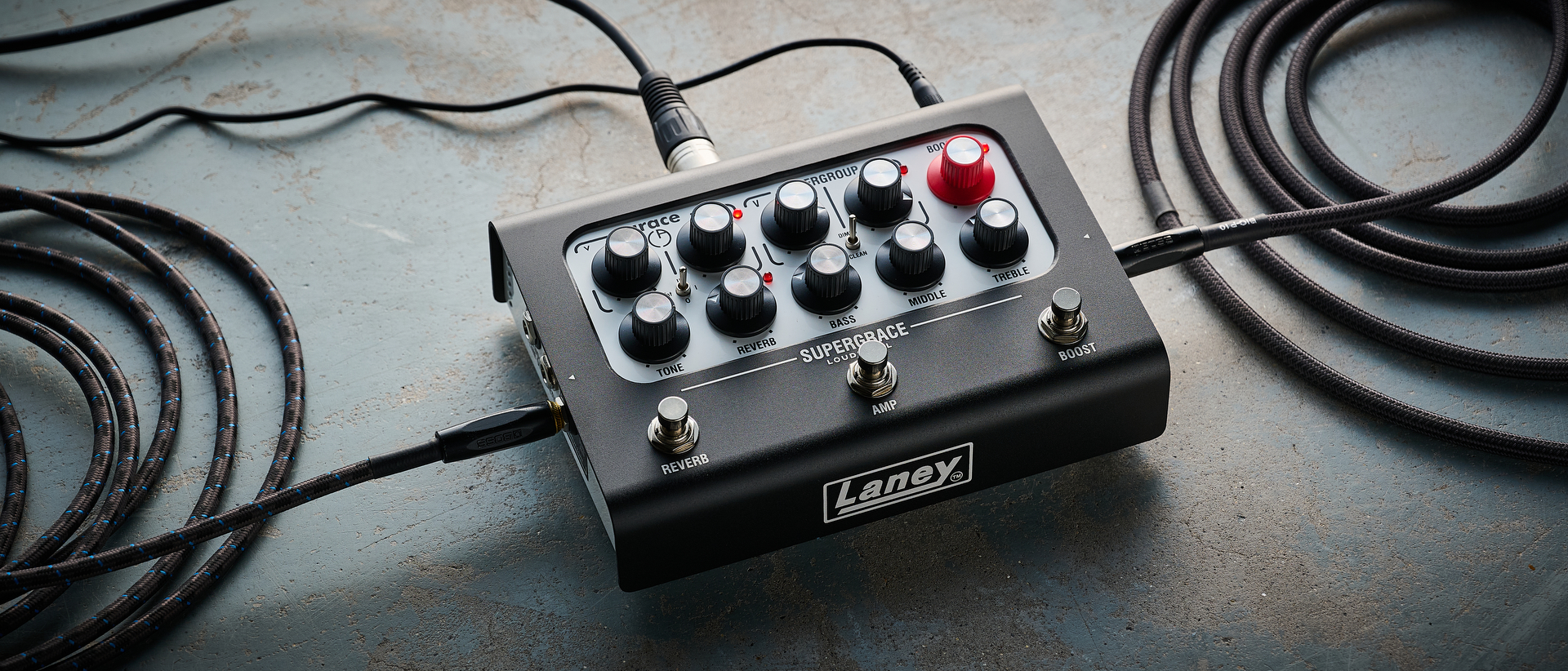“I had seen Slash on TV, but I didn’t know his name. Then I got Guitar Hero III. That’s how I was able to know who he was. Then I started to actually hear him play”: Christone “Kingfish” Ingram talks touring with Slash – and his hunger to learn guitar
Kingfish discovered Slash via Guitar Hero and now will be sharing the stage with him at S.E.R.P.E.N.T. Festival. He talks about what it means to play an all-star blues fest and take the art form further

All the latest guitar news, interviews, lessons, reviews, deals and more, direct to your inbox!
You are now subscribed
Your newsletter sign-up was successful
Christone “Kingfish” Ingram is only 25, but he’s been a hot name in the blues world for going on a decade. And it’s hardly surprising: He was practically born into the blues.
Hailing from Clarksdale, Mississippi – the supposed site of the crossroads where Robert Johnson traded his soul to the Devil – Ingram, who grew up in a musical family, was surrounded by church gospel music, as well as the playing of local Delta legends, from an early age.
He received an education in the blues at the nearby Delta Blues Museum (where he also earned the “Kingfish” moniker) and, as a pre-teen, started gigging at local clubs and venues.
Initially hailed as a child prodigy (at 15 he performed for Michelle Obama as part of a Delta Blues Museum student delegation to the White House), Ingram truly came into his own with his 2019 debut, Kingfish, which demonstrated a style, highlighted by fiery lead licks, a sweet-but-stinging tone, rich vocals and a mature songwriting approach, that was stunning for an artist of any age.
Since then, he has released a critically lauded follow-up, 662, supported a wide range of artists onstage, from Buddy Guy to the Rolling Stones to indie rockers Vampire Weekend, won a Best Contemporary Blues Album Grammy and even designed his own signature guitar, the Fender Kingfish Telecaster Deluxe. He’s also picked up a few famous fans along the way.
“The first time I heard him play, I was just floored,” Slash says about Ingram. “He’s such a naturally soulful musician, and everything he does seems to really come from the heart, and also come pretty effortlessly, in a melodic sense.
“I really dig his style of playing and his style of singing and his whole trip. I’ve been following him ever since the first time I heard him, all the way up to this point where, doing the festival, he was one of the people that I definitely wanted to have on.”
All the latest guitar news, interviews, lessons, reviews, deals and more, direct to your inbox!
Ingram is similarly excited to be along for the ride. “What I’m looking forward to is all the great music that’s about to be played with all the wonderful talent,” he says.
As for what he loves about the blues in general? “It’s just one of the coolest and simplest ways to really express yourself. You can’t fake the song with the blues. That’s what I love about it; it’s real simple and straightforward.”
What are you most looking forward to with the S.E.R.P.E.N.T. Festival?
“I’m looking forward to seeing all the blues-rock talent, like Larkin Poe and Eric Gales and all of them. When Slash and his team reached out for me to do some dates and he told me who was going to be a part of it, I just thought it was a no-brainer to do it.”
You’ve recorded with several of the artists on the tour, like Eric Gales and Keb’ ’Mo.
“Right. I worked with Eric on his 2017 release, Middle of the Road. I also did some work on one of Keb’s last records, and he played on one of mine [Listen, from Kingfish].”
One of the great things about the bill is there’s so many different expressions of the blues that are represented.
“Definitely. Not everybody can rock it hard, so you’ve got Keb’ for the smooth people, right? But for the people that do like to rock it hard, you’ve got Eric Gales and Samantha Fish and players like that. It’s just a big melting pot of artists.”
When did you become familiar with Slash?
“It was when I was in seventh grade. I had seen him on TV and everything, but I didn’t know his name. But then I got the Guitar Hero III game, and that’s how I was able to fully know who he was. Then when I really started to actually hear him play, I remember listening to his version of The Thrill Is Gone that he did with Slash’s Blues Ball, which is one of my favorite versions of that song. I definitely became a fan.”
Blues is life, so the life stories and the storytelling got me as well
What was the thing you remember that first attracted you to the blues?
“Well, I was fully immersed in gospel music before I got into the blues. So when I first heard the blues, I thought it was interesting to hear the secular parallel of what I was doing, or what I was listening to, because in a lot of ways they’re the same. So just to get the parallel of that, the secular side, was kind of what drew me in.
“And blues is life, so the life stories and the storytelling got me as well. I remember one of my first introductions was when my dad showed me a PBS documentary on Muddy Waters, and also me seeing B.B. King on Sanford and Son when I was a kid.”
You started performing from a very young age. How did your playing develop so quickly?
“I was just really determined. I really wanted to learn how to play. I’m still determined now, but at that time I had this, like, hunger for it. I was eager. So I would learn from my teachers in class, and then go home and practice, get on YouTube and study great blues guys and stuff like that. I was always doing it. It was pretty much all I did.”
How old were you when you started gigging?
“I would say somewhere in the window of 10 to 12. Somewhere in there. But I’m originally a bass player, so at the time I was gigging as a bass player sideman. I started to perform on the guitar maybe three years later.”
I imagine most kids your age were probably listening to more contemporary music and artists. Did you feel like an outsider for being into the blues?
“Oh, definitely. Because where I come from the blues is, like, grown-folk music. So the fact that I was listening to that, while everybody else was listening to pop and hip-hop and what’s described as Top 40, it felt different. But that was okay.”

When you’re playing blues, do you think about how to bring modern elements into it?
“Definitely. One of the ways that we can get young kids in is if we add some of the elements from their world. And when we get ’em in, we can teach about the foundation and where it all came from. But it’s a very slippery slope, because you don’t want to go too far to where you’re creating something else. So it’s best to always keep the foundation in there somehow.”
In your opinion, what are five blues songs everyone should hear?
“Well, I can start by giving you a whole album – B.B. King, Live at the Regal. Then I’d also say Albert King, Answer to the Laundromat Blues, and Freddie King, Hide Away. Now, two more… you really put me on the spot with this one. [Laughs] I’ll say Love in Vain by Robert Johnson and… let’s go with Son House, Death Letter Blues.”
How would you describe your lead guitar style?
“I would say rough, but smooth at the same time. [Laughs] Yeah. It’s like a freight train that takes breaks, if that makes sense.”
Do you think being from Clarksdale influenced your style at all?
“Definitely. I really think if I was born somewhere else, I probably wouldn’t even have known what the blues was. But it was from hearing legends like Big Jack Johnson, and a host of other local bluesmen, that shaped my sound to what it is now.”
What will be your main guitar-and-amp setup on the S.E.R.P.E.N.T. Festival?
“At the moment, I’ve been using three different guitars – my Fender signature Tele, and then I’ve got a couple customs from my guy Michael Chertoff [Chertoff Custom Guitars]. I’ve also been using a Gibson Black Beauty, so I may pull that out on the tour, too. As for amps, I’m basically just using two [Fender] Twins.”
You mentioned your signature Tele. What are some of the special features on the Kingfish Telecaster Deluxe that you wanted Fender to include in the design?
“Well, I pretty much asked them to make me an LP-sounding guitar. So one of the special features is the pickups [Custom Kingfish Humbuckers], which are custom-wound and give you really good, classic ’57 overdriven hard rock tones. But then you can also scale them back and get smooth r&b tones. So they’re very versatile. And the guitar has some style to it as well, which I like.”
Last year you put out a live record, Live in London, that captured you and your band onstage at The Garage. What led you to want to release a concert document?
“You know, I’m often told that the Kingfish live experience is quite different from hearing me on the album and whatnot. So I wanted to give the fans what they wanted, because they’ve been asking for it. And this way I feel that, for somebody who hasn’t come to a Kingfish show, they can get the full-on experience by listening to the album.”
As far as playing live goes, this fall you’re going to be part of the Experience Hendrix Tour – its first run in five years – alongside Kenny Wayne Shepherd, Zakk Wylde, Eric Johnson, your current tour mate Samantha Fish and others. Was Jimi a big influence on you?
“Definitely – so having the opportunity to jam on a bunch of Hendrix songs, that’s going to be so cool. I don’t really play Strats too often, but I’ll be able to bring out a few for that tour. And I don’t know what songs I’m playing yet, but I’m definitely excited. We always have fun jamming on Hendrix stuff.”
Until then, you’ll be out with Slash on the S.E.R.P.E.N.T. Festival. What do you hope people take away from these shows?
“What I’m looking forward to most is all the camaraderie. I just hope people take away from it the knowledge that we can all unite in the blues. We can forget our woes and forget our ills and just be there, together, with the music.”
- See S.E.R.P.E.N.T. Festival for dates and ticket details.
Rich is the co-author of the best-selling Nöthin' But a Good Time: The Uncensored History of the '80s Hard Rock Explosion. He is also a recording and performing musician, and a former editor of Guitar World magazine and executive editor of Guitar Aficionado magazine. He has authored several additional books, among them Kurt Cobain: Montage of Heck, the companion to the documentary of the same name.







